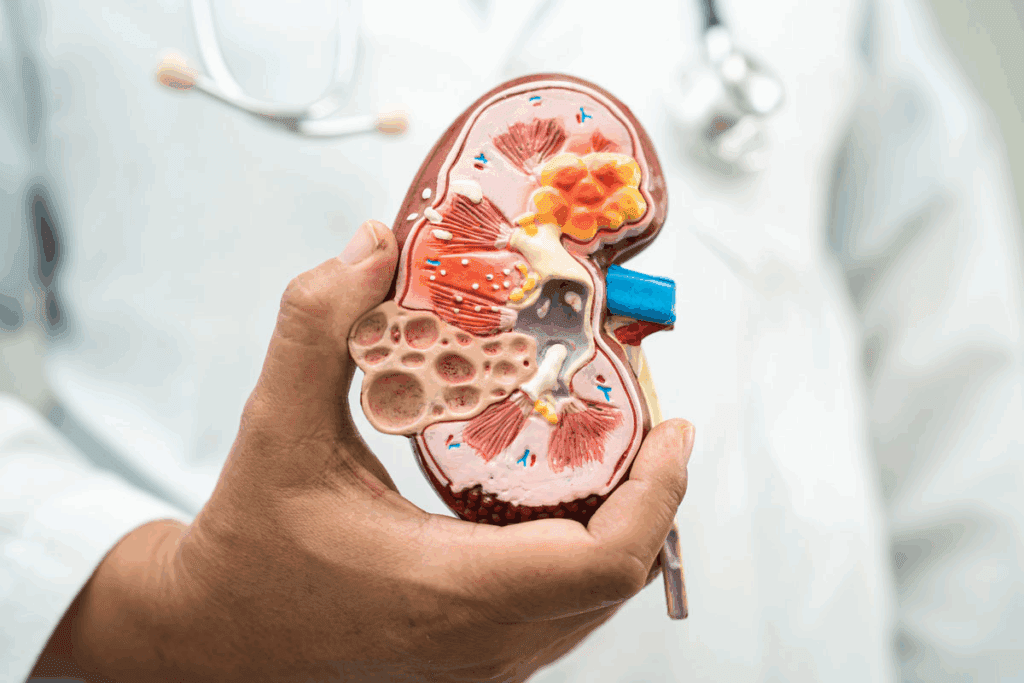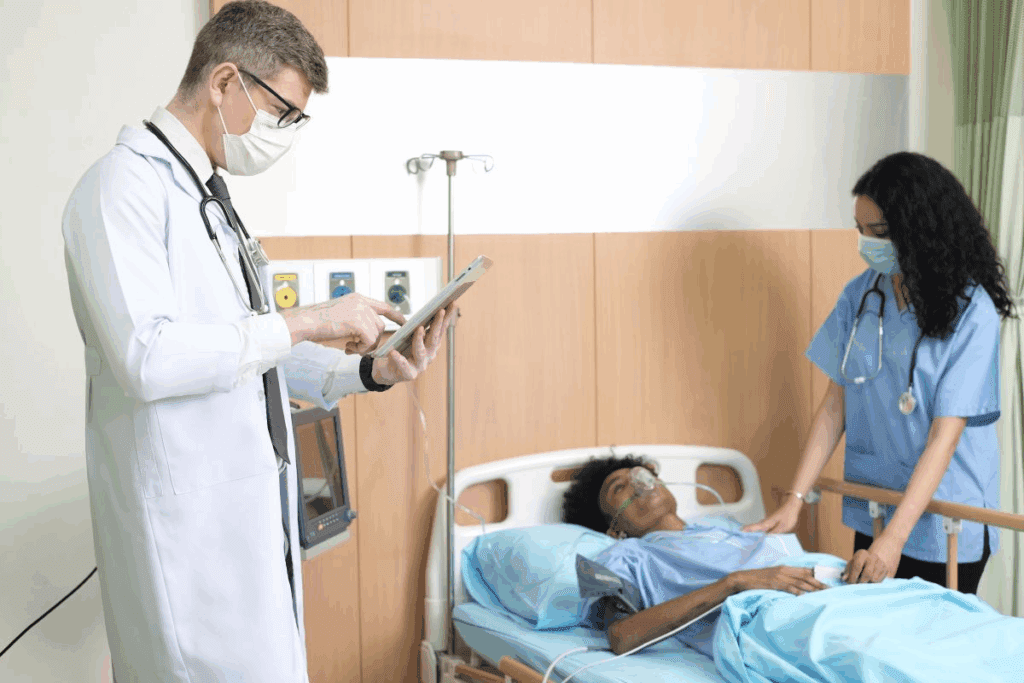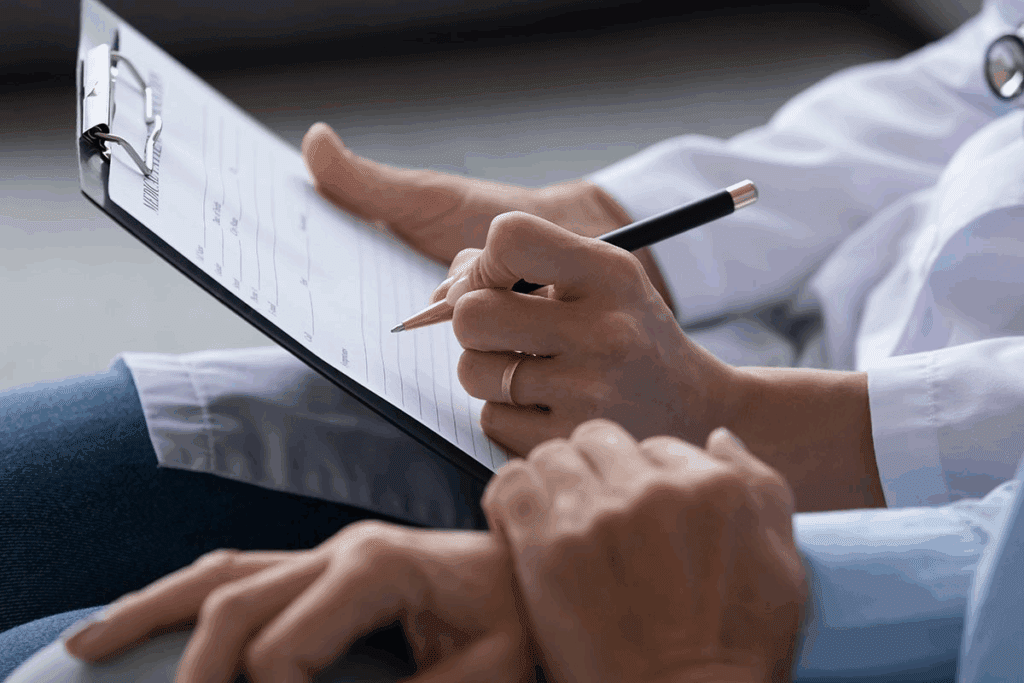
Kidney disease is a big health problem, affecting about 35.5 million Americans. The Centers for Disease Control and Prevention (CDC) says many people don’t know they have it because early kidney disease symptoms are often subtle or absent. Some key symptoms to watch for include foamy urine, frequent urination at night, swelling in the legs or feet, fatigue, itchy skin, and changes in urine appearance such as blood or foam. Early detection and care can really help manage kidney disease and prevent its progression.
At Liv Hospital, we stress the need for regular check-ups, mainly for those at risk. Spotting the early warning signs is key to protecting your health. If you’re at risk or notice something odd, getting medical help is very important.
Key Takeaways
- Millions of Americans are affected by kidney disease, often without knowing it.
- Early detection is key to changing the condition’s course.
- Regular screening is advised, mainly for those at risk.
- Spotting early signs can help keep you healthy.
- Getting medical help can make a big difference if you’re at risk or showing symptoms.
Understanding Kidney Disease: A Silent Health Crisis

Kidney disease is often silent in its early stages, posing a big health risk. It can progress without symptoms until it’s too late. It’s key to know about kidney roles and signs of trouble.
What Your Kidneys Do and Why It Matters
Our kidneys are vital for health. They filter waste and excess fluids, making urine. They also help control blood pressure and balance nutrients.
Any problem with these functions can cause serious health issues. It’s important to spot early signs of kidney disease.
The kidneys filter waste from the blood. If they fail, waste can build up, causing health problems. Knowing how important kidneys are can help protect them.
The Prevalence of Kidney Disease in America
Kidney disease is a big health issue in the U.S., affecting millions. It’s often linked to diabetes and high blood pressure. Spotting signs of renal problems early can help manage the disease.
Many people don’t know they have kidney disease until tests for other health issues find it. This shows why awareness and regular check-ups are so important, for those at risk.
Why Early Detection of Kidney Disease Matters

Finding kidney disease early can change its course for the better. It often goes unnoticed until it’s too late. So, catching it early is key.
The Silent Progression of Kidney Damage
Kidney damage can sneak up on you, with your kidneys working even when they’re badly hurt. Stage 1 Chronic Kidney Disease (CKD) shows a normal kidney function but with protein in the urine. This is a sign of early damage.
Regular check-ups are vital, more so for those at risk. Risk factors like diabetes and high blood pressure increase the chance of kidney disease.
Benefits of Early Intervention
Acting fast on kidney disease can stop it from getting worse. It also tackles the root causes. Early detection lets doctors start treatments that slow the disease down.
“Early detection and treatment of kidney disease can significantly improve patient outcomes, reducing the risk of complications and improving quality of life.”
Early action brings many benefits:
- Slowing disease progression
- Managing conditions like high blood pressure and diabetes
- Lowering the chance of heart problems
| Benefits | Description |
| Slowing Disease Progression | Early action can slow down kidney disease. |
| Managing Underlying Conditions | Controlling diabetes and high blood pressure helps prevent more damage. |
| Reducing Cardiovascular Risk | Early detection and care lower heart disease risks. |
Knowing the value of early detection and action helps people protect their kidneys.
Kidney Disease Symptoms: Recognizing the Early Warning Signs
Knowing the signs of kidney disease is key to getting help early. Kidney disease often goes unnoticed, so it’s important to watch for warning signs.
Changes in Urination Patterns
One of the first signs of kidney disease is changes in how you pee. You might pee more often, see foam, or notice blood. If you see any of these, see a doctor right away.
Swelling in Ankles, Feet, and Legs
Swelling in your legs and feet can mean kidney disease. When kidneys don’t work right, they can’t get rid of extra water. This leads to swelling and can also make you gain weight.
Persistent Fatigue and Weakness
Kidney disease can make you feel very tired and weak. This is because your kidneys can’t clean out toxins. This lack of energy is a sign that something’s wrong.
Skin Changes and Itching
Changes in your skin, like dryness and itching, can also be a sign. These happen when waste builds up in your blood. It’s a sign that your kidneys might not be working right.
Knowing these signs can help you take care of your kidneys. If you notice any of these, see a doctor. They can help figure out what’s going on and treat it.
Advanced Warning Signs That Kidney Function Is Declining
Kidney disease can cause noticeable changes in the body. As kidney function gets worse, you might see signs that mean you need to see a doctor right away.
Nausea, Vomiting, and Loss of Appetite
Toxins build up when kidneys don’t work well. This can make you feel sick to your stomach, throw up, and lose your appetite. It’s because the kidneys can’t filter waste properly, making your body toxic.
Nausea and vomiting can make you dehydrated. This can make kidney problems worse. It’s important to get help from a doctor to manage these symptoms.
Metallic Taste and Bad Breath
As kidney disease gets worse, you might taste metal or have bad breath. This happens because urea builds up in your saliva. It changes how things taste and can cause bad breath.
Shortness of Breath and Sleep Problems
Feeling short of breath can happen when your body holds onto too much fluid. This is because your kidneys can’t remove fluid. This condition, called pulmonary edema, can really affect your life and needs quick medical help.
People with kidney disease often have trouble sleeping. The discomfort and stress from kidney problems can make it hard to sleep well.
| Symptom | Description | Possible Complication |
| Nausea and Vomiting | Buildup of toxins | Dehydration |
| Metallic Taste and Bad Breath | Urea buildup in saliva | Altered taste, Halitosis |
| Shortness of Breath | Excess fluid in lungs | Pulmonary Edema |
Understanding Your Risk Factors for Kidney Disease
Knowing the risk factors for kidney disease is key to managing our health. By spotting these risks, we can act early to protect our kidneys.
Medical Conditions: Diabetes and Hypertension
Some health conditions raise the risk of kidney disease. Diabetes and hypertension are the top causes. Diabetes harms the kidneys’ blood vessels, making it hard to filter waste. High blood pressure also damages these vessels, leading to kidney disease.
Other conditions that may up the risk include:
- Autoimmune diseases, such as lupus
- Polycystic kidney disease (PKD)
- Recurrent kidney infections
Genetic and Demographic Risk Factors
Genetics play a big part in kidney disease risk. If you have a family history of kidney disease, you’re at higher risk. Certain groups also face higher risks due to demographics:
| Demographic Factor | Increased Risk |
| Age over 60 | Yes |
| African American, Hispanic, or Native American descent | Yes |
| Family history of kidney disease | Yes |
Medication and Environmental Risk Factors
Some medicines and environmental factors can also harm the kidneys. Long-term use of NSAIDs can damage kidney function. Exposure to toxins and heavy metals is also linked to kidney disease.
By knowing these risks, we can work with our doctors to keep our kidneys healthy. This helps us make better care choices.
Diagnostic Tests That Detect Kidney Disease Early
Finding kidney disease early is very important. It helps slow down the disease. There are simple tests that can do this. These tests help doctors find kidney problems early.
Blood Tests: Understanding eGFR and Creatinine Levels
Blood tests are key to checking how well the kidneys work. The eGFR test shows how well the kidneys filter waste. eGFR is based on creatinine levels, age, gender, and race.
Creatinine is a waste from muscle breakdown. High levels mean the kidneys are not working well.
Here’s what eGFR values mean:
| eGFR Value | Kidney Function |
| 90 or above | Normal kidney function |
| 60-89 | Mildly reduced kidney function |
| 30-59 | Moderately reduced kidney function |
| 15-29 | Severely reduced kidney function |
| Less than 15 | Kidney failure |
Urine Tests: The Importance of Albumin-Creatinine Ratio
Urine tests are also very important. The albumin-creatinine ratio (ACR) test checks for protein in the urine. This shows kidney damage. A high ACR means kidney problems.
Finding kidney disease early helps slow it down. This is through the right treatment and lifestyle changes.
Imaging and Additional Diagnostic Approaches
Imaging tests like ultrasound or CT scans can also help. They show the kidneys and find problems like cysts or tumors. A kidney biopsy can also diagnose certain conditions.
These tests are key to finding kidney disease early. They help slow the disease and improve health outcomes.
When to See a Doctor About Kidney Concerns
If you’re feeling symptoms or have risk factors for kidney disease, it’s important to know when to see a doctor. Kidney disease can sneak up on you without clear signs until it’s too late. So, it’s key to take care of your kidney health early on.
Urgent Warning Signs That Require Immediate Attention
- Some symptoms mean you need to see a doctor right away. These include:
- Severe swelling in the legs, ankles, or feet
- Persistent fatigue or weakness
- Changes in urination patterns, such as foamy urine or decreased output
- Shortness of breath or difficulty breathing
- Confusion or difficulty concentrating
If you notice any of these signs, don’t wait to get medical help. Catching kidney disease early can make a big difference.
Preparing for Your Kidney Health Appointment
Getting ready for your doctor’s visit can help. Here’s what you can do:
| Preparation Step | Description |
| List your symptoms | Detailing when they started and how often they occur |
| Note your medical history | Including any conditions like diabetes or hypertension |
| Bring your medications | A list of all prescription and over-the-counter drugs you’re taking |
| Prepare questions | For your doctor about your kidney health and concerns |
Being ready can lead to a better talk with your doctor about your kidney health. Share all your symptoms and medical history to get the best care.
Seeing a kidney specialist if you’re worried or at risk is a smart move. We’re here to help you create a treatment plan that fits you.
Lifestyle Changes to Protect Your Kidney Function
Keeping your kidneys healthy needs the right diet, regular exercise, and managing health issues. By making these lifestyle changes, you can lower your risk of kidney disease. We’ll look at key changes to protect your kidney function.
Dietary Approaches for Kidney Health
Eating right is key for kidney health. Avoid foods high in sodium, sugar, and bad fats. Eat more fruits, vegetables, and whole grains for nutrients and fiber. Watch your protein intake and choose good sources like lean meats, fish, and eggs.
Exercise and Weight Management
Exercise is important for your overall health, including your kidneys. It helps control blood pressure and keeps your weight in check, both vital for avoiding kidney disease. Try to do at least 30 minutes of moderate exercise daily. Walking, cycling, and swimming are great choices.
Managing Underlying Conditions
Diabetes and high blood pressure are big risks for kidney disease. Controlling these with medicine, diet, and lifestyle is key to protecting your kidneys. Regular health check-ups are important to keep these conditions in check and adjust treatments as needed.
Conclusion: Taking Control of Your Kidney Health
Understanding the risks and symptoms of kidney disease is key. By doing so, you can protect your kidneys. Early detection and action can greatly improve your kidney health and overall well-being.
Protecting your kidney health means making smart choices. This includes eating right, managing health issues like diabetes and high blood pressure, and staying active. These steps help lower your risk of kidney disease.
Preventing kidney disease is vital. By following kidney health tips, you can lower your risk. Regular health checks and screenings can catch problems early, allowing for quick action.
By focusing on kidney health, you can keep your kidneys working well and prevent disease. We urge everyone to take care of their kidney health. Make informed choices for a healthier future.
FAQ
What are the early symptoms of kidney disease?
Early signs of kidney disease include changes in how you urinate. You might also notice swelling in your ankles, feet, and legs. Feeling tired and weak, and skin changes are other signs. It’s important to notice these symptoms and get medical help.
How do I know if I have bad kidneys?
Bad kidneys might show symptoms like changes in urination, swelling, and feeling tired. Skin changes and other signs are also possible. Blood and urine tests can check your kidney health.
What are the signs of renal problems?
Renal problems can show as changes in urination, swelling, and feeling tired. You might also notice skin changes, nausea, vomiting, loss of appetite, and shortness of breath. These symptoms need medical attention.
How can I protect my kidney function?
To protect your kidneys, eat healthy, exercise, and manage your weight. It’s also important to control conditions like diabetes and high blood pressure.
What are the risk factors for kidney disease?
Kidney disease risks include diabetes, high blood pressure, and genetics. Environmental factors also play a role. Knowing these risks helps you take steps to protect yourself.
What diagnostic tests are used to detect kidney disease?
Tests for kidney disease include blood tests for eGFR and creatinine. Urine tests check albumin-creatinine ratio. Imaging tests also help detect kidney disease early.
When should I see a doctor about kidney concerns?
See a doctor for urgent signs like severe swelling, trouble breathing, or persistent nausea and vomiting. Knowing your medical history and symptoms helps prepare for your appointment.
Can lifestyle changes help manage kidney disease?
Yes, changes like a healthy diet, exercise, and managing weight can help. They also slow disease progression.
What are the advanced warning signs of declining kidney function?
Advanced signs include nausea, vomiting, loss of appetite, and bad breath. Shortness of breath and sleep problems are also warning signs. These need immediate medical attention.
How does diabetes affect kidney health?
Diabetes is a big risk for kidney disease. High blood sugar damages kidney blood vessels. Managing diabetes is key to protecting your kidneys.
What is the importance of early detection of kidney disease?
Early detection is key because it allows for early treatment. This can prevent further damage and address risk factors. It improves your overall health.
References
National Center for Biotechnology Information. (2025). How to Know if You Have Kidney Disease. Retrieved from https://www.ncbi.nlm.nih.gov/books/NBK535404/























